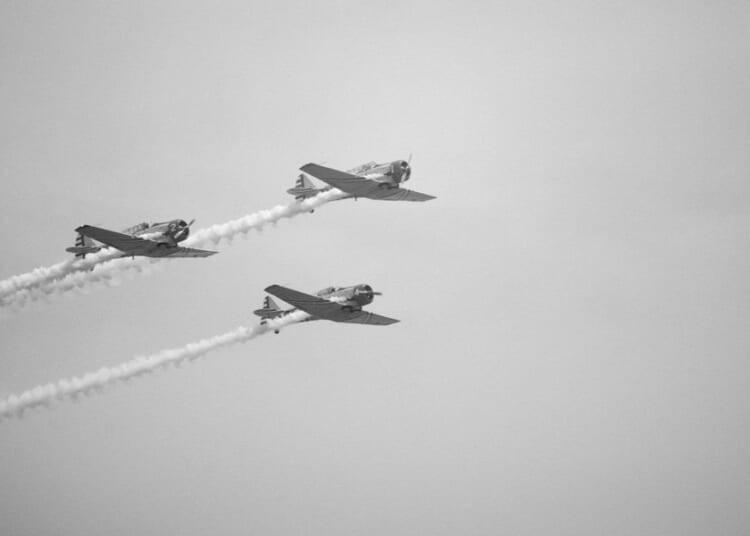I’VE just finished watching Masters of the Air, the third television mini-series created by Steven Spielberg and Tom Hanks telling the stories of American combat units in the Second World War.
It focuses on United States Army Air Force bomber squadrons based in England, and follows the Spielberg / Hanks productions Band of Brothers (2001) – about US parachute infantry in Western Europe after D-Day – and The Pacific (2010), about US Marines fighting the Japanese.
Like the earlier two, Masters of the Air is superbly and lavishly produced, the whole nine-episode series costing around £280million to make, some £30million or more per episode. It’s also similar in that it’s based on real events – the exploits of the 100th Bombardment Group, which from 1943 operated B-17 Flying Fortresses from Thorpe Abbotts air base in Norfolk in raids over Germany.
Masters of the Air is, like its predecessors, a brilliant, multi-layered spectacle. Nothing has been spared to achieve authenticity. The aerial combat sequences, especially, are brutal and breathtaking. Apparently, the filmmakers built full-size replicas of Flying Fortresses, right down to the dashboard switches. On the ground, scenes are also strikingly portrayed.
On the negative side, there are digs at the British, which seem obligatory when Spielberg is telling a war story. He has form, of course. In his 1998 movie Saving Private Ryan, he gave us a totally gratuitous remark about Britain’s top wartime general, Bernard Montgomery, when a US Army officer growled: ‘That guy’s overrated.’
In Band of Brothers, there is a scene where a British tank commander refuses the pleas of the US paratroopers to fire on a German tank – because it is next to a farmhouse and he has been ordered not to damage private property.
Masters of the Air goes even further in its Brit-bashing. Right at the start, it is made clear that the Yanks defeated the Nazis with their top-secret Norden bombsight and their ‘precision’ bombing. They bravely attacked during daylight, while the cowardly British blundered about over the Reich at night, cravenly hiding in the darkness and carpet-bombing whole cities. All rubbish, of course.
Back in Blighty, civilians are mainly bland and yokel-ish, or fun-loving local girls, while RAF officers are effete, condescending snobs. To ram home the point, when one British flier calls the US daylight bombing policy ‘suicidal’ he is soundly thrashed in a fist fight with an American.
Later in the war, we are told how the advent of the P51 North American Mustang long-range fighter-bomber as an escort gave the Fortress crews guaranteed protection against German interceptors. We’re not told, of course, that the Mustang became a success only after it was refitted with the British-designed Rolls-Royce Merlin engine.
Presumably Spielberg – whose father was an air force mechanic in the Far East during the war – feels he must insert these jibes to play to the prejudices and conceptions of American audiences. If so, he does himself a disservice.
These niggles apart, I’d recommend Masters of the Air. I must admit though, that watching all three Spielberg / Hanks series, I’ve felt more than a twinge of envy. I know we’ve had superb British war films in the past, such as The Dam Busters and Reach for the Sky. But with their lustrous, slick, hugely expensive multi-episode productions, the Americans have effectively captured the narrative of the Second World War as popular history.
I’d love to see similar stuff made about the British fighting forces during the war. After all, there are more than enough exciting, inspiring stories to choose from. Sadly, I doubt if any producer has the will or the wherewithal to do such a Spielberg / Hanks-style series. And on second thoughts, what would be the point? Because, as well we know, the Yanks and the Soviets won the war, didn’t they?

